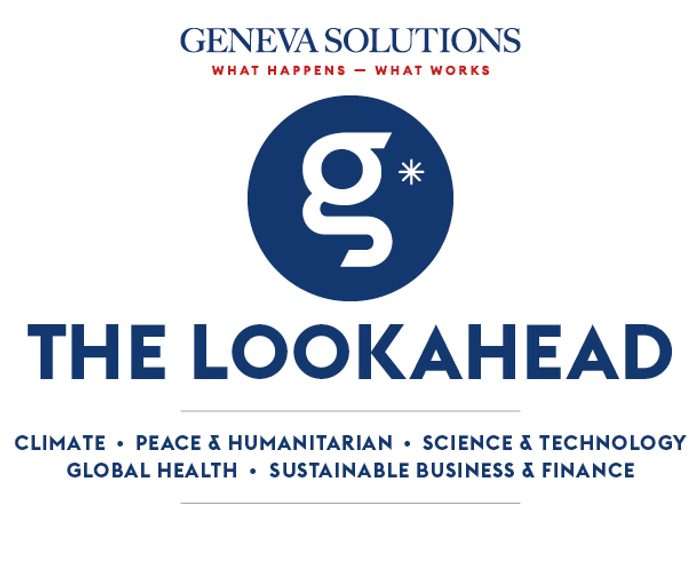Good morning, this is Paula. President Trump’s retreat from multilateralism appears to have inspired and emboldened autocrats around the world to do the same.
In Azerbaijan, where the government ordered the closure of UN agencies and the ICRC, a detained Afghan refugee calls for assistance ahead of her family’s imminent deportation back to Taliban hands.
The ICRC’s Pierre Krähenbühl shares his concerns about “an increasingly permissive interpretation of international humanitarian law”, while the director of the DiploFoundation says international Geneva’s funding crisis may offer an opportunity for artificial intelligence to be used to its advantage. |

Azerbaijani president Ilham Aliyev and United Nations secretary general António Guterres at the UN climate change conference COP29 in Baku, Azerbaijan, 12 November 2024. (Keystone/EPA/Stringer)
|
|
|
🕯️TWO YEARS OF RELENTLESS WAR.
Since violent clashes began between the Sudanese army and its former ally, the paramilitary Rapid Support Forces, on April 15 2023, Sudan has become the world’s largest humanitarian crisis. Half of the country's 50 million people are in need of assistance, unable to feed themselves, according to the World Food Programme, which warns that famine continues to spread.
Meanwhile, humanitarians struggle to respond. Between 70 and 80 per cent of health facilities are out of operation, often damaged by shelling and airstrikes, while humanitarian convoys transporting food and water have come under attack. According to the UN, "at least 84 aid workers have been killed trying to address these needs".
Both warring sides have been accused of grave violations, including subjecting civilians to widespread sexual violence. The International Committee of the Red Cross has called on the warring parties to respect international humanitarian law. "The protection of civilians and unhindered humanitarian access are not negotiable," the organisation said in a statement.
|
|
Funding woes.
Thirteen million people have fled their homes, including to neighboring countries, such as Chad, where, in border regions, one in three people is a refugee. But dwindling foreign aid is hindering the response to the crisis beyond Sudan's borders. “They have little access to water, and we have no money at the moment to dig for water,” Filippo Grandi, the head of the UN’s refugee agency, told the BBC last week.
|
|
Ceasefire push.
Two years on, peace efforts are at a stalemate. Tomorrow, on the day of the conflict's second anniversary, foreign ministers from nearly 20 countries will meet in London to establish a group to try to nudge the two opponents – themselves absent from the talks – closer to peace.
Last week, the ICRC Sudan delegation chief, Daniel O’Malley, urged for "concerted diplomatic and humanitarian efforts to bring the Sudanese people much-needed relief”.
|
|
🚢TRADE CLASHES.
The World Trade Organization is also holding informal consultations this week with a number of countries that have expressed concern over the impact of Trump’s ever-changing tariffs. Last week, Switzerland and Singapore, along with 34 other countries, circulated a statement at a trade meeting to express their support for the global body and deplore “the rise of protectionism”.
|
|
Swiss complaint on the table.
A spokesperson for the Swiss foreign ministry said at an event organised by Geneva Solutions that Bern was considering the option of joining China and Canada in filing a complaint against Trump’s tariffs for violating global trade rules. The Swiss parliament is due to look at the issue this week.
|
|
Nicolas Walder,
a Green Party national councillor, said: “Some of the members of the nationalist right would like to see multilateralism replaced with bilateralism. What they don’t understand is that 90 per cent of what goes in bilateral agreements is grounded on international law….Multilateralism is what ensures that Switzerland can remain a sovereign, independent nation.”
|
|
🔔ICYMI.
On Friday, the UN relief agency, Ocha, announced it would lay off 20 per cent of its global workforce – about 500 staffers – to cope with a $60 million funding gap driven by foreign aid cuts by the US and other western donors.
|
|
Pandemic treaty within reach.
After an intense round of talks that reportedly ran into Saturday morning, countries reached an agreement "in principle" over how to pandemic-proof the world.
Negotiators are set to reconvene on Tuesday to hash out the final details over the transfer of technology between developed and developing nations – one of the issues that has remained persistently contentious over the last three years of negotiations.
– By Paula Dupraz-Dobias and Michelle Langrand
|
|

Pierre Krähenbühl, ICRC director general, 1 April 2025 in Geneva. (Nora Teylouni/Le Temps)
|
|

Illustration image. (Freepik)
|
|
|
23-24 May 2025 | AI Negotiation Challenge.
Artificial Intelligence is reshaping diplomacy, policymaking, and negotiations. Are you ready to harness its potential? The Geneva Graduate Institute and Frontline Associates invite you to the AI Negotiation Challenge, a high-stakes multilateral simulation on irregular migration in the Euro-Mediterranean Zone.
Participants can expect to:
👉Gain practical experience in AI-driven negotiation
👉Refine their decision-making skills with expert coaching
👉 Receive a Certificate of Participation from the Geneva Graduate Institute and Frontline Associates
Enhance your negotiation skills with AI! Register now.
|
|
|
GS news is a new media project covering the world of international cooperation and development. Don’t hesitate to forward our newsletter!
Have a good day!
|

|
|
Avenue du Bouchet 2
1209 Genève
Suisse
|
|
|
|











